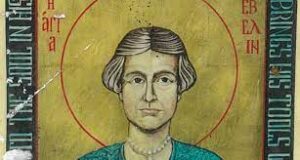Although some of Evelyn Underhill’s comments feel so much of her time (1875-1941), I find myself attracted to the seriousness of her work, and the mixture of spiritual and psychological insights present in what she writes. In the early 1930s she has a long correspondence with someone initialled DE. Here’s a flavour of what they discuss.
The correspondent is wanting to ‘let go of the self’ and Evelyn counsels: ‘we can never become un-selfed on our own – it is God’s work in us. We can only open the door and say, “Do what you like.” In the next correspondence she responds to DE who is in bed suffering the strain of what being open to God means.
‘We have to feel utterly helpless, weak, and unable to stand up to it, if we are ever to learn real trust and abandonment … Don’t struggle to find proof of God’s existence when He seems to vanish … von Hugel [EU’s own early spiritual director] in his little book of prayer compares this experience to meeting a sandstorm in the desert – and says the Arab, then, doesn’t struggle with the situation but accepts it, lies down in the sand, covers his head with his mantle, and just waits. That is what you are asked to do.’
Clearly DE is struggling, as during the following Lent, Evelyn repeats the above advice: ‘I am so sorry things are being hard … Just lie down quietly as you can in the dust and wait for the Lord; don’t struggle – it is perfectly useless at such times, and merely exhausting…’
Six months later:
‘After all, if you choose Christ you start on a route that goes over Calvary, and that means the apparent loss of God as a bit of it. There is no by-pass. But as long as you were getting the assurance of God, your offering wasn’t absolute, was it? … So face up to it, and thank Him (for He is there all the time …) Apart from this attempt at acceptance, don’t do anything. It isn’t your fault, it is just part of the route – and God will again show Himself when you are through this bit. Don’t struggle with prayer you can’t do – just say “Into Thy hands I commend my spirit”. Continue your Communions quite steadily … Remember it is you who are temporarily blinded, not the world that has gone black. Early bed, novels, the flicks and so on are all good and help to minimize the nervous strain … it is a normal experience in spiritual growth. … As von Hugel says, “it is so much more He who must hold us, than we who must hold Him”’
DE visits the doctor with nervous strain and is given a sedative (!). Evelyn responds that it is all ‘psycho-physical and should be dealt with from that end’ – again advising DE to accept what is happening and what has happened to her in the past and trust that God is somehow present. She diagnoses it as ‘a psychic illness’. (Perhaps some time in therapy might have helped, but would DE have been able to find a therapist sympathetic to spirituality and religion at a time when Freudian analysis was so central …)
A few months later Evelyn writes:
‘I don’t know when anything has made me so happy as your letter. I’ve always felt that if only you could be protected from discouragement and persuaded to carry on, God would show himself to you – and then you would know it was, in spite of all the difficulties and sufferings, more than worth while …it is so wonderful.’
Happy Easter!
